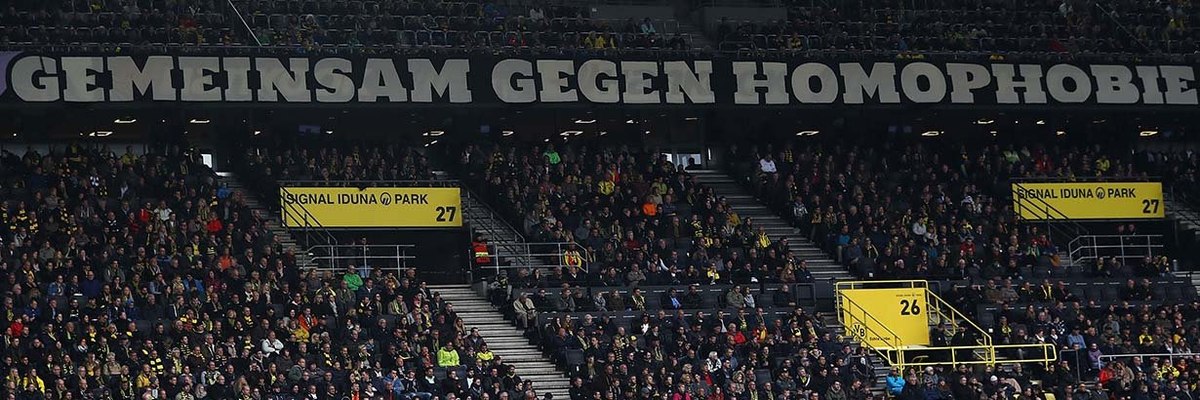Many fans believe anti-gay prejudice is widespread in the men’s game in their home country, and amounts to a serious problem
May 17 marks International Day Against Homophobia, and this year there are reported plans among several male professional football players in Germany to reveal their sexuality on that day.
While some of the players involved are reportedly still ‘hesitant’, should the event come to pass it would be a major moment in international football. There are reportedly only six known gay professional footballers worldwide, only two of whom play for top-division clubs in their countries.
In 2022 a YouGov UK study examined perceptions on the issue of homophobia in professional football. Ahead of the expected announcements in Germany, we have now repeated that study in the five largest footballing nations in Europe – Britain, France, Germany, Italy and Spain.
Our study examines how many fans – and the wider population – see homophobia as a widespread and serious issue in professional football in their country, how that compares to other forms of discrimination, and how things have changed in the last 10 years.
It also looks at why people think gay footballers have decided to keep their sexuality secret, what kind of reaction they think footballers who reveal their sexuality will receive, and how likely we are to see footballers making such revelations in the next 12 months.
How widespread do football fans in Europe see homophobia as being in professional football?
German football fans are the least likely to think that homophobia is widespread within professional football in their country – perhaps an indicator of why the group coming-out is taking place there. Nevertheless, this still amounts to 40% of German fans saying that homophobia is “very” or “moderately” widespread, compared to 48% who think it is not.
By contrast, French fans are the most likely to believe that homophobia is widespread in the game nationally, at 58% – only 31% disagree. Fans in Britain are divided – 46% think it is widespread, while 45% do not.
How big a problem do football fans in Europe see homophobia as being within the sport?
French fans are likewise the most likely to see homophobia as a serious problem in professional football nationally – 67% say so, including 38% who see it as a “very serious” problem. Only 27% don’t see it as a problem.
German and British fans are the least likely to see homophobia as a serious problem in the sport at the professional level, although attitudes are divided: 46% in each country see it as a problem compared to 44-46% who do not.
Do football fans in Europe think the situation with homophobia has gotten better or worse in the last 10 years?
While many fans in each country believe that homophobia is a widespread problem in the sport, there is a tendency to believe that the situation is better now than it was ten years ago.
British fans in particular think things have improved in the last 10 years (55%), compared to 43-46% in the other countries surveyed.
French fans are the most likely to say homophobia has actually become worse in the sport over the last 10 years, at 29%.
How does homophobia compare to other discrimination issues in football?
While concerns about homophobia in football are substantial across Europe, in each country fans are more likely – by some margin – to see racism as widespread and a serious problem in the sport. Around three quarters of fans in France, Spain and Italy (74-76%) see racism as a serious problem in football, as do 70% of British fans and 61% of German fans.
The number of fans in each country saying that sexism is a serious problem in professional football are generally comparable to those saying homophobia is, while fewer fans are likely to see Islamophobia and anti-Semitism as serious issues in the game.
How do football fans in Europe think people will react to male footballers revealing their sexuality?
Fans in each country are consistently likely to think the most negative response to footballers revealing that they are gay will come from the fans of opposing teams. This is especially true in the UK, where 56% of fans believe that ‘out’ players can expect a negative reception from fans of the teams they are facing on the pitch.
By contrast, in Spain fans are about as likely to think opposing fans will give a positive reception (33%) as they are a negative one (29%) – and a further 35% expect a neutral response.
Across all five countries, fans are most likely to expect the gay players’ teammates to give a positive response, with British fans being the most likely of all (71%) to expect a positive response in the locker room.
What do football fans in Europe think are the biggest reasons that gay male footballers have not revealed their sexuality?
There is a remarkable diversity of views between fans in different countries on whose potential reaction is most responsible for keeping players in the closet.
In the UK football fans are most likely to think the potential reaction from the media is a top reason why football players haven’t revealed they are gay, at 60% compared to 25-39% in the other countries surveyed.
This is, incidentally, massively different to what British fans said in our 2022 study, when only 35% gave the media response as a top reason footballers were not revealing their sexuality. This is likely because of the positive reception that Jake Daniels had received in the days preceding that survey, which two years on Britons appear to have forgotten.
Expectations among British fans otherwise remain largely the same between the older and newer study. If we look past the figures for the media, we see that 56% of British fans think reactions from other teams’ fanbases are a top reason keeping players in the closet – again notably more so than in other countries (32-45%).
By contrast, only 11% of British football fans think the reaction from the player’s club is a key reason – however this is actually among the most common expectations in all the other countries, especially in Italy (47%).
German fans are particularly likely to think that the potential reaction from other teams’ fans (45%) and their own clubs (41%) are making gay players reluctant to reveal their sexuality, while fans in France and Spain are about equally likely to lay the blame on fans on both sides, clubs and the media.
How likely do football fans in Europe think it is that male footballers will reveal their sexuality in the next 12 months?
YouGov’s 2022 study in the UK was conducted after Jake Daniels, a player at the-then second-flight English team Blackpool FC, revealed that he is gay, making him the first active male professional footballer in the UK to come out as gay since the 1990s.
In that survey, we asked football fans how likely they thought it was that other male professional football players would reveal they are gay in the next 12 months. Two thirds of British fans (68%) said they thought this was likely; in the event only one player did so, Zander Murray who was then at fifth-division Scottish side Gala Fairydean Rovers.
With Murray’s September 2022 announcement the only one to occur in the UK since then, it is perhaps no surprise to see that two years on the number of fans expecting players to publicise their sexuality any time soon has dropped significantly, to 45%.
Ironically, given the expected announcements on Friday, fans in Germany are the least likely to think that male players will reveal themselves to be gay in the next 12 months, at 38%. This probably reflects a lack of awareness of the impending announcement on 17 May, rather than an expectation that it will not come to pass.
What do you think about homophobia in football, LGBTQ+ rights more generally, and everything else? Have your say, join the YouGov panel, and get paid to share your thoughts. Sign up here.
Photo: Getty











